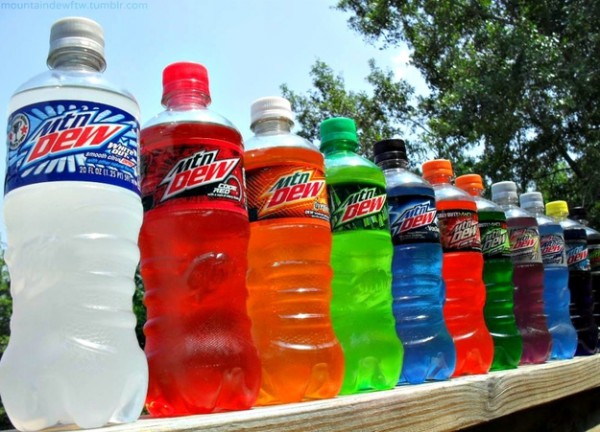4. Flame Retardant Drinks
If you are a US citizen and prefer drinking Mountain Dew or other citrus-flavored sodas and sports drinks, then you should be aware of the fact that you are also getting a dose of brominated vegetable oil (BVO), a synthetic chemical. Chemical companies originally patented it as a flame retardant.
Researchers have proven that BVO can bioaccumulate in human tissue and breast milk, and the results from the animal studies have shown that it causes some serious reproductive and behavioral problems. Bromine is actually a central nervous system depressant, and a common endocrine disruptor. It is member of the halide family.
It is the same group of elements that includes fluorine, chlorine and iodine. When bromine enters the organism, it competes for the same receptors that capture iodine. This can sometimes result in iodine deficiency, which can seriously affect your health.
Where it is banned: Europe and Japan
5. Processed Foods Containing Artificial Food Colors and Dyes
US manufacturers add more than 3,000 food additives, such as preservatives, flavorings, colors and other ingredients to the foods you eat, also including infant foods and foods for young children. Many of these foods are banned in other countries in the world.
This was based on the results of a research that found it has toxic and hazardous health effects, and it is also associated with the adverse effects on children’s behavior.
Where it is banned: Norway and Austria.
6. Arsenic-Laced Chicken
The US Food and Drug Administration approved adding arsenic-based drugs to the animal food in the US, because these make animals grow quicker and the meat gets a nice pink color (i.e. it looks “fresher”).
FDA has confirmed that these products are safe because they contain organic arsenic, considered to be less toxic than the inorganic form, known for its cancer-causing effect.
The problem appeared when some scientific reports stated that this organic arsenic could easily transform into inorganic arsenic, found in elevated levels in chickens sold in supermarkets. The cancerogenic arsenic also contaminates the manure and it can eventually migrate into the drinking water and it may also raise the arsenic levels in the US rice.
In 2011, Pfizer said it would voluntarily stop marketing Roxarsone, an arsenic-based feed additive, but unfortunately, there are still a few others on the market.
Some environmental groups have raised a lawsuit against the FDA asking for their removal from the market. Meanwhile, the European Union, have never approved arsenic-based compounds as safe for animal feed nor used these for that purporse.
Where it id banned: The European Union
The article continues on page 4…



Comments